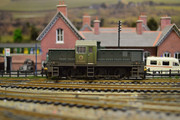Diesel / hydraulic electric models
Diesel / hydraulic electric models
Good afternoon
Just wondered if anyone has a diesel / hydro electric specific collection or purely a set up concentrating on the classes?
I have a real love of such models and would love to see if anyone has a comprehensive collection and or some advice on which specific models to buy and or avoid ?
Many thanks in advance
Daz
Just wondered if anyone has a diesel / hydro electric specific collection or purely a set up concentrating on the classes?
I have a real love of such models and would love to see if anyone has a comprehensive collection and or some advice on which specific models to buy and or avoid ?
Many thanks in advance
Daz
- Walkingthedog
- Posts: 4972
- Joined: Thu Oct 04, 2018 5:51 pm
- Location: HAZLEMERE, BUCKS.
- Contact:
Re: Diesel / hydraulic electric models
I have these. The Westerns except for the desert sand are Dapol as is the Hymek. The Warships are Bachmann. The desert sand Western is Lima hand painted but not brilliant. The others are excellent.
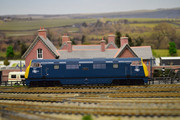
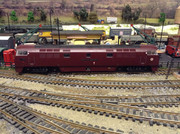
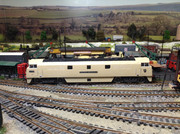
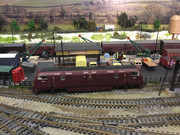
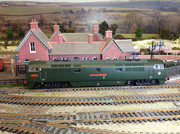
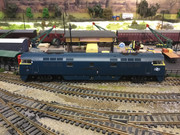
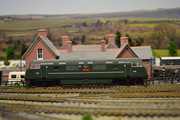
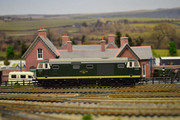








Nurse, the screens!
Re: Diesel / hydraulic electric models
I have a dapol western, Excellent. Bought it a few years ago .
Re: Diesel / hydraulic electric models
Hydraulics are not my mainstream interest, but I still have a class 35, Hornby, in blue, a Warship, and a Western Lima maroon and desert sand respectively. I also have a Mainline/Bachmann Warship in need of TLC. Added to these I have a Heljan class 14 but in Blue Circle livery.
The Heljan 14 run OK but in my opinion they are not 'light tight' and the internal lighting comes out where it shouldn't.
The Heljan 14 run OK but in my opinion they are not 'light tight' and the internal lighting comes out where it shouldn't.
LC&DR says South for Sunshine
- Walkingthedog
- Posts: 4972
- Joined: Thu Oct 04, 2018 5:51 pm
- Location: HAZLEMERE, BUCKS.
- Contact:
-
Mountain Goat
- Posts: 1537
- Joined: Fri Oct 05, 2018 12:57 pm
- Contact:
Re: Diesel / hydraulic electric models
I have a Warship somewhere. It is a lovely thing. It is a diesel hydraulic. I have not heard of a diesel hydraulic electric. Should you have written diesel hydraulic/electric meaning either a diesel electric or a diesel hydraulic?
Diesel hydraulics could pull a lot more for their size and weight, but needed higher revving diesel engines and therefore needed slightly shorter times inbetween services.. After years of trials, though diesel hydraulics were far more powerful in the loads they could pull, diesel electrics tended to be slightly cheaper overall (Not by much) so as B.R. had ended up with too many locos, they decided that after a culling of any classes that were less successful or less useful, they then decided to concentrate on diesel electrics instead. Another possible reason for this was that certain individuals in government circles back then who had connections with Brush who made the diesel electric traction motors.
A change of government later and during the last few years of B.R., the decision was made to go back to hydraulic traction again with the second generation DMU's (Which actually were third generation) so that they could get away with using bus and lorry engines which turned out to be a great success such as classes 150, 153 (155), 156, 158, 159 etc.
I have heard first hand accounts of drivers who drove the hydraulics. One said he loved the Hymeks after he once pulled a 20 coach train from Paddington to South Wales and didn't even lose any time. I asked if a class 47 could do rhat. He said a class 47 couldn't even pull anywhere near that many coaches let alone trying to keep to time.
Diesel hydraulics could pull a lot more for their size and weight, but needed higher revving diesel engines and therefore needed slightly shorter times inbetween services.. After years of trials, though diesel hydraulics were far more powerful in the loads they could pull, diesel electrics tended to be slightly cheaper overall (Not by much) so as B.R. had ended up with too many locos, they decided that after a culling of any classes that were less successful or less useful, they then decided to concentrate on diesel electrics instead. Another possible reason for this was that certain individuals in government circles back then who had connections with Brush who made the diesel electric traction motors.
A change of government later and during the last few years of B.R., the decision was made to go back to hydraulic traction again with the second generation DMU's (Which actually were third generation) so that they could get away with using bus and lorry engines which turned out to be a great success such as classes 150, 153 (155), 156, 158, 159 etc.
I have heard first hand accounts of drivers who drove the hydraulics. One said he loved the Hymeks after he once pulled a 20 coach train from Paddington to South Wales and didn't even lose any time. I asked if a class 47 could do rhat. He said a class 47 couldn't even pull anywhere near that many coaches let alone trying to keep to time.
Budget modelling in 0-16.5...
Re: Diesel / hydraulic electric models
wow ! just wowWalkingthedog wrote: ↑Fri Dec 27, 2019 3:22 pm I have these. The Westerns except for the desert sand are Dapol as is the Hymek. The Warships are Bachmann. The desert sand Western is Lima hand painted but not brilliant. The others are excellent.

Re: Diesel / hydraulic electric models
My apologies poor grammar.Mountain Goat wrote: ↑Fri Dec 27, 2019 7:35 pm I have a Warship somewhere. It is a lovely thing. It is a diesel hydraulic. I have not heard of a diesel hydraulic electric. Should you have written diesel hydraulic/electric meaning either a diesel electric or a diesel hydraulic?
Diesel hydraulics could pull a lot more for their size and weight, but needed higher revving diesel engines and therefore needed slightly shorter times inbetween services.. After years of trials, though diesel hydraulics were far more powerful in the loads they could pull, diesel electrics tended to be slightly cheaper overall (Not by much) so as B.R. had ended up with too many locos, they decided that after a culling of any classes that were less successful or less useful, they then decided to concentrate on diesel electrics instead. Another possible reason for this was that certain individuals in government circles back then who had connections with Brush who made the diesel electric traction motors.
A change of government later and during the last few years of B.R., the decision was made to go back to hydraulic traction again with the second generation DMU's (Which actually were third generation) so that they could get away with using bus and lorry engines which turned out to be a great success such as classes 150, 153 (155), 156, 158, 159 etc.
I have heard first hand accounts of drivers who drove the hydraulics. One said he loved the Hymeks after he once pulled a 20 coach train from Paddington to South Wales and didn't even lose any time. I asked if a class 47 could do rhat. He said a class 47 couldn't even pull anywhere near that many coaches let alone trying to keep to time.
absolutely correct diesel electric and or diesel hydraulic, I too heard the stories from old drivers of immense power, and reliability also, from the units.
the power was also delivered in a quicker curve somewhat like the instant power produced by electric cars therefore enabling the unit to reach top speed far quicker.
personally its the sound that gets me that whoosh and the raw growl of power, once heard never forgotten
-
Mountain Goat
- Posts: 1537
- Joined: Fri Oct 05, 2018 12:57 pm
- Contact:
Re: Diesel / hydraulic electric models
Diesel electrics don't rev so highly. Different engines. I seem to recall some diesel engines used on locomotives were 2 stroke engines. I am not sure if these were higher revving or not. The co-bos were said to be 2 stroke if my memory serves me correctly. Were these diesel electric though? All sorts of experiments were tried as the main issue they had in the early days was they could use a mechanical gearbox for shunting at slower speeds, but the mechanical gearboxes were not strong enough to cope with heavy trains at speed and they needed a power trnsmission with a bit of "Give" to it.
Railcars were light enough to get away with a mechanical gearbox and so many were built.
It was the Germans who first built a sucdessful express locomotive with a diesel engine and a hydraulic gearbox if I am not mistaken, and it was so successful, we basically copied their design (With much co-operation and permission etc) and these became the Warships.
If you see the German locos and the Warships together, they are very similar.
Diesel electric was the other main method used. Going back to the mechanical gearbox, one interesting locomotive made to test a theory was the "Fell" locomotive which was basically a double locomotive in one with two seperate engines and gearboxes to be used at different speeds. It was not as successful as they liked, but it did work, and fair play for trying! If we don't try, how do we know if they are going to work?
Mechanical history is fascinating.
I remember reading about two identical diesel shunters used to compare hydraulic to electric traction. They were identical in every way apart from the gearboxes, and both were put to work. In the end I believe the electric version was preferred.
But also, different factors also can come into designs and suitbility. For example, a line down where I live used to use triple headed class 03's which were diesel mechanical shunters. These were essential for the lower part of the line as diesel electric would not go through floods with low slung traction motors. Any electrical components were all set up high on the class 03's used. They also had to have cut down roofs as the line was once a canal, so the height of two of the bridges were 10 inches lower then standard.
In the steam days the locos used would sometimes end up stuck as the floods would reach the firebox levels and put the fires out!
Railcars were light enough to get away with a mechanical gearbox and so many were built.
It was the Germans who first built a sucdessful express locomotive with a diesel engine and a hydraulic gearbox if I am not mistaken, and it was so successful, we basically copied their design (With much co-operation and permission etc) and these became the Warships.
If you see the German locos and the Warships together, they are very similar.
Diesel electric was the other main method used. Going back to the mechanical gearbox, one interesting locomotive made to test a theory was the "Fell" locomotive which was basically a double locomotive in one with two seperate engines and gearboxes to be used at different speeds. It was not as successful as they liked, but it did work, and fair play for trying! If we don't try, how do we know if they are going to work?
Mechanical history is fascinating.
I remember reading about two identical diesel shunters used to compare hydraulic to electric traction. They were identical in every way apart from the gearboxes, and both were put to work. In the end I believe the electric version was preferred.
But also, different factors also can come into designs and suitbility. For example, a line down where I live used to use triple headed class 03's which were diesel mechanical shunters. These were essential for the lower part of the line as diesel electric would not go through floods with low slung traction motors. Any electrical components were all set up high on the class 03's used. They also had to have cut down roofs as the line was once a canal, so the height of two of the bridges were 10 inches lower then standard.
In the steam days the locos used would sometimes end up stuck as the floods would reach the firebox levels and put the fires out!
Budget modelling in 0-16.5...
-
Mountain Goat
- Posts: 1537
- Joined: Fri Oct 05, 2018 12:57 pm
- Contact:
Re: Diesel / hydraulic electric models
Ooh. Question. Class 02's. I have seen books saying they were diesel hydraulic and others have said they were diesel electric. Were there some electric and others hydraulic?
Budget modelling in 0-16.5...
Who is online
Users browsing this forum: No registered users and 2 guests
